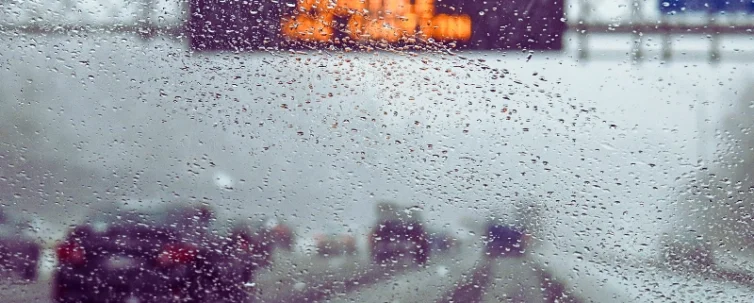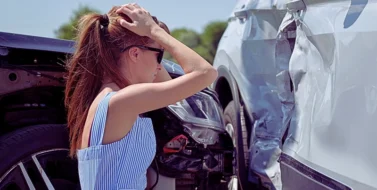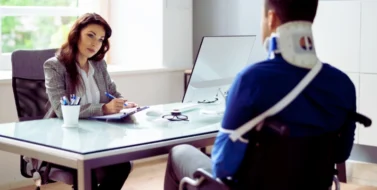Chicago’s weather affects car accident liability, especially during icy and rainy conditions. Assigning liability in bad weather accidents hinges on a driver’s adaptability to the weather and road conditions. Illinois drivers are legally required to adjust their overall driving behavior according to the weather. Failure to do so could lead to liability for the crashes that occur. Learning more about how weather conditions affect liability is crucial if you’re involved in an accident in adverse weather.

If you or a loved one was a victim of a weather-related accident, contact the Chicago car accident lawyers at Lloyd Miller Law by dialing 773-838-8100 to discuss your case in detail and explore your legal options.
Table of Contents
Lake Shore Drive Pileups: How Ice and Speed Combine to Create Liability
Snow and ice reduce the friction between your car tires and the road, making it harder for the tires to get a solid grip on the road’s surface. Speeding in icy conditions can cause a driver to lose control of his or her vehicle, slide off the road or onto other traffic lanes, and collide with oncoming traffic. Illinois law requires drivers to lower their speed to account for the weather and road conditions. Safe driving in icy conditions demands smooth acceleration and braking and avoiding abrupt maneuvers. Loss of control on icy roads is usually a sign of driving too fast for the weather conditions.
When weather-related car accident cases go to court, courts often evaluate whether the driver adjusted his or her speed based on the conditions. A driver who doesn’t adjust his or her speed appropriately for icy conditions and causes an accident could be found negligent. The driver could be held liable for the resulting damages.
Icy roads increase stopping distances significantly. Drivers who don’t reduce speed and increase the distance between themselves and the car ahead could cause rear-end accidents. Such drivers can be held responsible for the accidents. Failure to reduce the speed and increase the following distance in icy conditions could also result in massive pileups. Determining liability in multi-car Chicago accidents on icy roads typically requires accident reconstruction with assistance from a car accident lawyer. The involvement of multiple parties could affect how long a car accident lawsuit takes.
Rain-Slicked Roads in Cook County: When Drivers Can’t Blame the Weather
There are about 119 rainy days a year in Chicago. According to the Federal Highway Administration (FHWA), more than 77% of weather-related crashes occur in rain or mist conditions. Cook County rains can wreak havoc on roads. Rain causes roads to become slick with rainwater. Rainwater can also combine with oil, grease, grime, and other pollutants that have built up on the roads over time to create extremely slick road surfaces. Slick surfaces from rain can decrease tire traction and cause longer stopping distances.
Drivers are expected to slow down and increase following distances when it’s raining. Speeding and following too closely in wet conditions can be considered negligent behavior and result in liability for rain-related crashes in Cook County.
Driving too fast on wet roads can cause hydroplaning accidents. Hydroplaning occurs when a layer of water between the tires and the road surface causes the tires to lose traction and the vehicle to lose control. The vehicle may veer in any direction. Besides speeding, worn tires can cause hydroplaning. If a car that causes a hydroplaning accident is found to have had worn tires, the driver may bear responsibility for the crash due to negligent car maintenance.
Rain can also reduce visibility, making it harder to see other vehicles and road hazards and judge distances. Failing to adjust speed appropriately or use windshield wipers and headlights properly could be considered negligence and affect accident fault in such circumstances.
How a Chicago Car Accident Lawyer Proves Negligence in Storm-Related Crashes
Navigating storm-related crashes can be challenging. At-fault drivers may try to shift the blame to the victims. Insurance companies may also take advantage of the confusion over how weather affects car accident liability by shifting blame to the weather conditions and using that as an excuse to deny claims. Proving the other driver’s negligence is crucial.
Proving negligence and establishing liability in weather-related crashes requires attention to detail, thorough investigations, and the right type of evidence. That’s where car accident attorneys come in. Car accident attorneys conduct thorough investigations to identify at-fault parties and prove negligence. Some factors that attorneys look to establish to prove negligence include whether the other driver:
- Was driving too fast for the weather conditions
- Was following other cars too closely
- Failed to use headlights, wipers, or defrosters when there was low visibility
- Made abrupt lane changes
- Disregarded road hazard signs or weather alerts
- Had a vehicle with signs of poor car maintenance, such as broken lights and improperly inflated or worn tires
A car accident lawyer in Chicago will carefully gather evidence like police reports, videos from nearby surveillance cameras, traffic cameras, or dash cams, official weather data from the accident date, vehicle telematics to indicate speed and braking at the time of the crash, and eyewitness reports on weather or road conditions and the driver’s driving habits. If necessary, your lawyer may bring in accident reconstructionists and expert testimony to show how a driver failed to adjust his or her actions to the weather conditions.
Your car accident lawyer will review the evidence to determine how the other driver violated his or her duty of care and was negligent. He or she will work hard to ensure liability lies with the negligent driver and handle communications and settlement negotiations with the insurance companies.
Given the complications of weather-related crashes, seeking legal guidance is crucial. The Chicago car accident lawyers at Lloyd Miller Law have over 75 years of combined experience. We offer free consultations during which our lawyers evaluate your case and determine your legal options. Contact us today to schedule your free consultation.





